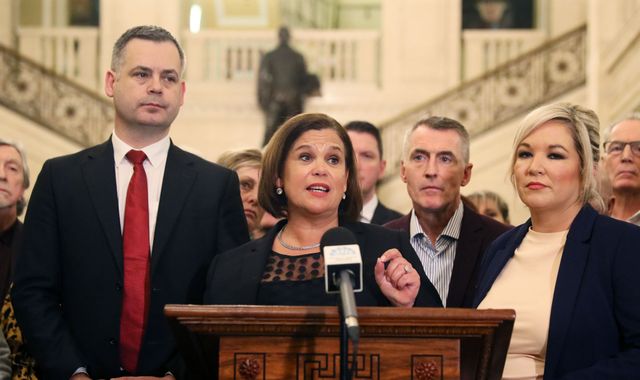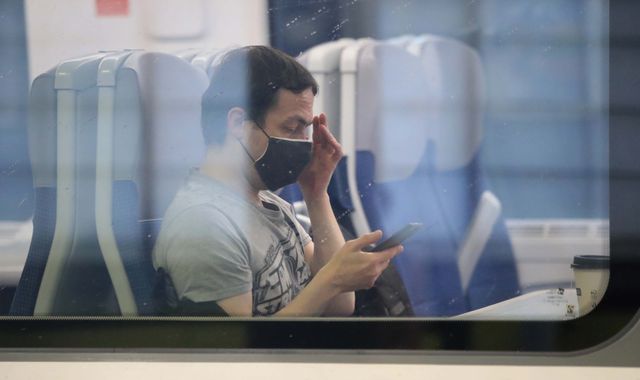Stormont: Sinn Fein backs draft deal to restore Northern Ireland powersharing
Written by News on 11/01/2020
Sinn Fein has agreed to back a deal to restore powersharing in Northern Ireland, ending a three-year deadlock.


The nationalist party signed up to the agreement after it was locked in talks with the Democratic Unionist Party (DUP) this week.
Sinn Fein’s endorsement means the two biggest parties will re-enter a mandatory coalition in Belfast, and the Assembly could sit on Saturday.
Peace process structures mean a ministerial executive can only function with the inclusion of the largest unionist party and largest nationalist party in the region.
Making the announcement on Friday, Sinn Fein President Mary Lou McDonald said: “We now have the basis to restore powersharing, and we’re up for that.
“There’s no doubt there are serious challenges ahead; the impact of Brexit, austerity and other pressing issues.
“But the biggest and most significant challenge will be ensuring we have genuine power sharing build on equality, respect and integrity.
“I believe that the powersharing government can work. That requires everyone to step up.
She added Sinn Fein was “committed” to Irish reunification efforts and to make sure all people across the north and south divide enjoy the same rights.
Sky’s Senior Ireland Correspondent, David Blevins, says he believes three things have made this agreement possible today.
He said: “Firstly, the fact that the DUP lost its political influence at Westminster following the last general election.
“The fact that the DUP and Sinn Fein were both punished in that general election.
“The DUP lost 1-in-6 voters – Sinn Fein lost 1-in-4, while the middle ground parties, especially the Alliance more than doubled its vote share – and that was viewed by many as a public judgement by the electorate of the failure of those big parties to restore powersharing in Northern Ireland.
“But I think the most decisive issue was the fact that there is a major health crisis in Northern Ireland.
“We’ve had nurses on the picket lines on strike today, for the third time in a month.
“So the public patience with the political vacuum and the lack of political progress – and the failure to compromise really had run out – and as a result of that, the two big parties were brought back to the negotiating table.
“They did the serious business that they used to engage in during the Peace Process of hammering out a deal.
“And last night, the British and Irish governments took the calculated risk to table what they described as a draft agreement – their best hope of seeing powersharing restored in Northern Ireland after a three-year gap”.
Boris Johnson has tweeted to say: “This is a great step forwards for the people of Northern Ireland.”
Labour leader Jeremy Corbyn has posted his congratulations, saying the Good Friday Agreement and peace process in Northern Ireland “is a proud Labour legacy we are committed to support and protect”.
Minutes after the text of the governments’ proposals were published on Thursday, the DUP’s leader Arlene Foster said it backed the draft agreement, saying it represented a “fair and balanced way” to restore powersharing – but that it was “not a perfect deal”.
The wide-ranging deal contains compromise solutions to the disputes at the heart of the three-year impasse, such as legislative provisions for Irish language speakers.
The Sinn Fein president insisted the “New Decade, New Approach” agreement was only the beginning, predicting that more gains for language would come in the future.
Ms McDonald also urged those disappointed with provisions outlined in the deal, to “take heart from the fact that this is now an historic moment because for the first time we have official recognition”.
Irish Foreign Affairs Minister Simon Coveney said “history has been made” today, adding that an executive could be formed on Saturday.
Speaking to reporters in Dublin after Sinn Fein backed the deal, he added: “Of course, that is not the end of the story as we want this to be an all-party executive so I hope that the Alliance Party and SDLP will also be able to join Sinn Fein and the DUP in that new executive.
“We hope that it may be possible that the executive will be formed tomorrow, but if not tomorrow, certainly Monday and to build on the momentum that is being created in the past 24 hours so that people can see positive political activity.
“People working together and setting an example and signal of positivity and show that politics in Northern Ireland can be a force for good and brings people together.”
:: Listen to the New Lines podcast on Apple Podcasts, Google Podcasts, Spotify, Spreaker
Northern Ireland Secretary Julian Smith has said: “A devolved government can now start delivering the reforms needed in our public services.
“After three years, it’s time to get back to work – for the people of Northern Ireland.”
The deal includes what the UK government has promised will be a major Treasury-funded financial package to tackle a host of problems since talks broke down 36-months ago, including the nurses’ strikes.
Under the terms of the agreement, the new executive will also take action to reduce spiralling hospital waiting lists; extend mitigation payments for benefit claimants hit by welfare reforms; increase the number of police officers on the streets; and resolve an industrial dispute involving teachers.
The resignation of the late deputy first minister Martin McGuinness three years ago triggered the collapse of the devolved institutions at Stormont.
The last DUP/Sinn Fein-led coalition government broke down in January 2017 following a row about a botched green energy scheme.
The dispute subsequently grew to include more traditional disagreements on matters including the Irish language and the thorny legacy of the Troubles.
(c) Sky News 2020: Stormont: Sinn Fein backs draft deal to restore Northern Ireland powersharing






